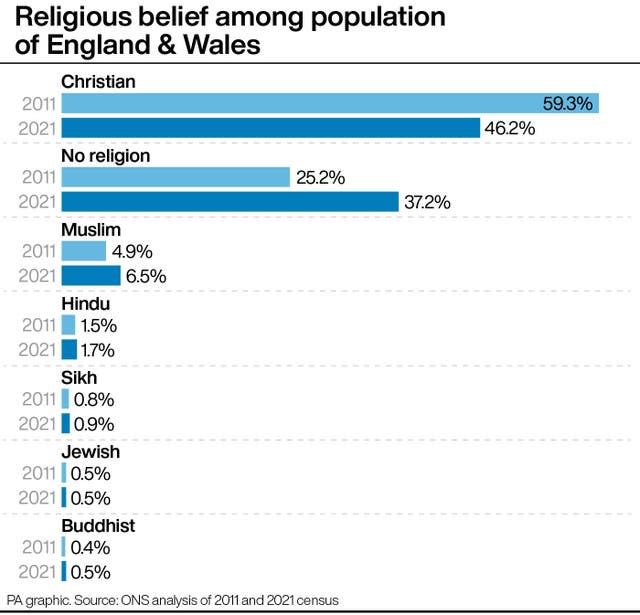Census shows number identifying as Christian has fallen below half of population
The proportion of people in England and Wales identifying as Christian has fallen below 50% for the first time, according to census data.
Some 46.2% of the population described themselves as Christian on the day of the 2021 census, down from 59.3% a decade earlier, the Office for National Statistics (ONS) said.
This is the first time the proportion has dropped below half.

The percentage of people saying they had no religion jumped from around a quarter in 2011 (25.2%) to over a third in 2021 (37.2%).
This was the second most common response and the number ticking this box has almost trebled since 2001.
There were increases in the proportion of people describing themselves as Muslim (up from 4.9% to 6.5%) and Hindu (from 1.5% to 1.7%).
In a third of households (32.7% – 8.1 million) all members reported the same religion, while 13.7% (3.4 million) have a mix of religious and non-religious people and in 1.1% (285,000) at least two different religions were reported.
In a fifth of households (20.4% – 5.1 million) all members said they had no religion.
London remains the most religiously diverse region of England, with just over a quarter (25.3%) of people on the day of the 2021 census reporting a religion other than Christian.
South-west England is the least religiously diverse region, with 3.2% selecting a religion other than Christian.
The religion question was voluntary on the 2021 census but was answered by 94.0% of the population of England and Wales, up from 92.9% in 2011, the ONS added.
The Archbishop of York said the country had “left behind the era when many people almost automatically identified as Christian”.
How does religious diversity in your local area compare with the rest of England and Wales? 📍 Use our interactive map to find out 🔎
➡️ https://t.co/Nv6VDkSO9i pic.twitter.com/cQsh3rzRmW
— Office for National Statistics (ONS) (@ONS) November 29, 2022
The Most Rev Stephen Cottrell said: “It’s not a great surprise that the census shows fewer people in this country identifying as Christian than in the past, but it still throws down a challenge to us not only to trust that God will build his kingdom on Earth but also to play our part in making Christ known.”
Humanists UK ran a campaign in the run-up to the 2011 and 2021 censuses encouraging non-religious people to tick the “no religion” box on the form.
Chief executive Andrew Copson said the figures should be a “wake-up call which prompts fresh reconsiderations of the role of religion in society”.
He said: “These results confirm that the biggest demographic change in England and Wales of the last 10 years has been the dramatic growth of the non-religious.
“They mean the UK is almost certainly one of the least religious countries on Earth.”
The National Secular Society said the figures show that aspects of society such as the Anglican establishment and daily prayers and worship in parliament and schools, are “all inappropriate, hopelessly outdated and fail to reflect the country we actually live in” and called for reform.
Chief executive Stephen Evans said: “It’s official – we are no longer a Christian country.”
He added: “The current status quo, in which the Church of England is deeply embedded in the UK constitution, is unfair and undemocratic – and looking increasingly absurd and unsustainable.”
The 2021 survey, carried out on March 21 last year, was filled out by more than 24 million households across England and Wales.
We’ve released #Census2021 data on national identity in England and Wales.
90.3% of the population selected at least one UK identity:
▪️ British▪️ English▪️ Welsh▪️ Scottish▪️ Northern Irish▪️ Cornish
This decreased slightly from 92.0% in 2011.
➡️ https://t.co/Hn1qUbOoiw pic.twitter.com/IUdAkKZBn7
— Office for National Statistics (ONS) (@ONS) November 29, 2022
The data released on Tuesday covers ethnicity, religion, national identity and language.
It also found that:
– Some 81.7% (48.7 million) of usual residents identified their ethnic group as white, a decrease from 86.0% (48.2 million) in 2011.
– In 2021, 91.1% (52.6 million) of usual residents aged three years and over had English (English or Welsh in Wales) as a main language.
– 90.3% (53.8 million) of usual residents identified with at least one UK national identity (English, Welsh, Scottish, Northern Irish, British and Cornish).
The census takes place across the UK every 10 years and provides the most accurate estimate of all the people and households in the country.
More data will be published in stages over the next two years.

 Yahoo Movies
Yahoo Movies 